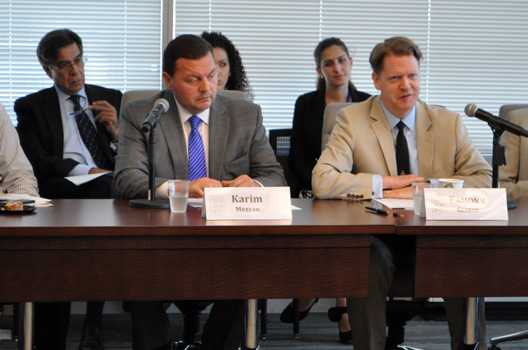 As Libya’s political crisis deepens and violent clashes mount, attention to the transitioning country has largely focused on the weak government in Tripoli and the tumultuous eastern region. The largely ignored southwestern party of the country known as the Fezzan, however, presents another set of challenges, with porous borders, ethnic and tribal tensions, and a widely shared sense of neglect. Valerie Stocker, an independent researcher and consultant, joined the Atlantic Council’s Rafik Hariri Center for the Middle East on Friday, June 27, 2014, via Skype to discuss her experience in the Fezzan and present her issue brief titled “Inside Libya’s ‘Wild West.'” Eamonn Gearon, a specialist in Arab affairs and cofounder and managing director of The Siwa Group, provided commentary. Hariri Center Senior Fellow Karim Mezran moderated the discussion.
As Libya’s political crisis deepens and violent clashes mount, attention to the transitioning country has largely focused on the weak government in Tripoli and the tumultuous eastern region. The largely ignored southwestern party of the country known as the Fezzan, however, presents another set of challenges, with porous borders, ethnic and tribal tensions, and a widely shared sense of neglect. Valerie Stocker, an independent researcher and consultant, joined the Atlantic Council’s Rafik Hariri Center for the Middle East on Friday, June 27, 2014, via Skype to discuss her experience in the Fezzan and present her issue brief titled “Inside Libya’s ‘Wild West.'” Eamonn Gearon, a specialist in Arab affairs and cofounder and managing director of The Siwa Group, provided commentary. Hariri Center Senior Fellow Karim Mezran moderated the discussion.
Stocker began by describing the situation on the ground in the Fezzan. The region is seen, both by foreign observers and by other Libyans, as a dangerous, lawless area. Though the security situation is certainly dire, Stocker views it as a failure of a national authority and security force, as there is security on a local level in tight-knit communities. Regrettably, the communities share little in common, with the exception of a desire for attention and inclusion from the rest of Libya, but the region’s geographical remoteness has resulted in political isolation.
Gearon added that, while southwestern Libyans want to feel involved, the Fezzan is accustomed to autonomy, and residents of the Fezzan harbor a historically validated distrust for the central government. Though there was optimism in the beginning of 2012 that smuggling, illegal migration, and other crimes could be addressed, now there is general agreement these issues are out of control. This consensus has not, however, translated into any agreement on how to remedy the security situation. Not only is there an absence of structures and institutions, but the existing bodies on the ground are poorly organized and responsibilities not clearly delineated. According to Stocker, few in the Fezzan would say they have benefited from the 2011 revolution as of yet; some would even say they were better off before.
While international actors and programs exist on the ground, Stocker articulated the frustration of Libyans who see well-intended interventions enacted without sufficient commitment and without results. Gearon suggested that it will take long-term, sustained involvement to affect change. Most importantly, Libya must hold a truly inclusive and legitimate national dialogue and create a new sense of Libyan identity.
